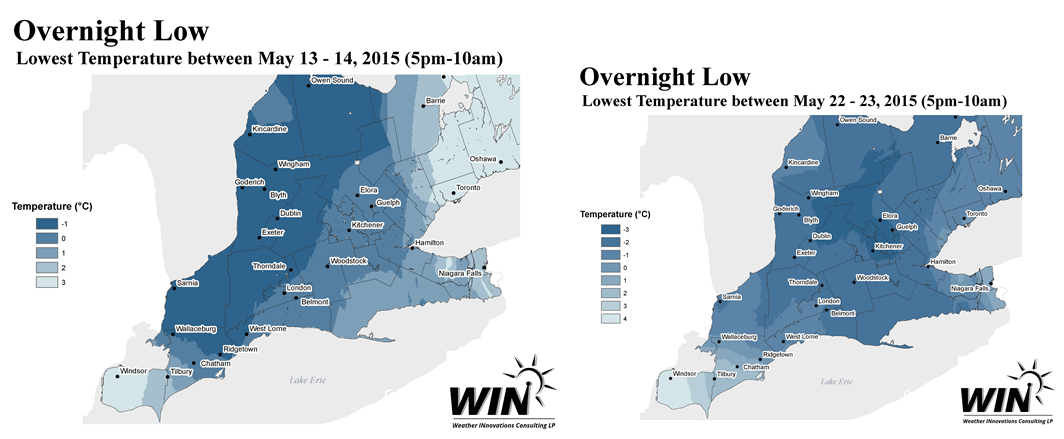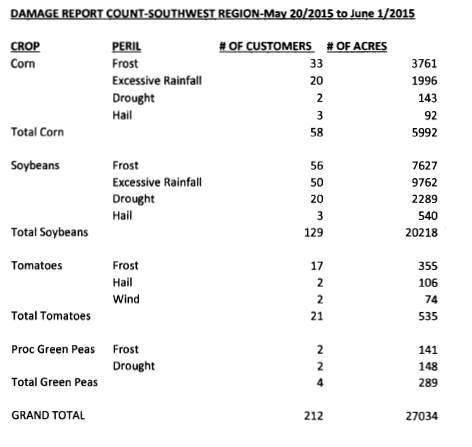Willson Hall, University of Guelph, Ridgetown Campus, 120 Main St. East. Ridgetown.
This week’s Breakfast courtesy of BASF Canada, thank you.
Synopsis: Dry conditions in many parts of the area have been alleviated with the rains over the past week especially the weekend. The rain was welcome with much of the area receiving 1.5” to 5” with central Essex receiving the most at 4 to 5”. Some areas of Essex have now received 8” of rain since May 1st. Corn and soybean crops in general are looking good especially compared to last year when planting was just finishing at this time.
The other curveball Mother Nature has thrown at us over the past few weeks is frost. Frost events have been sporadic resulting in some soybean and corn fields needing to be replanted in Kent, Essex, Lambton, Elgin and Middlesex. No-till and reduced tillage fields most prone to the frost this year. It appears soybeans planted before May 8 were impacted the most by the frost which equates to 21 days after planting. Frost tolerance for soybeans is -2.5C for 4 hours and for corn -1.8C for 4 hours depending on growth stage. Cereal crops such as winter wheat and rye fields did not escape the frost and some injury did occur resulting in curled or snagged wheat leaves/heads. Concern by many that frost injury will result in variable stands as well. Some participants noted little or slow regrowth on some of the corn plants due to multiple stresses (frost, excessive moisture, cold temperature, etc.). Cold injury (corkscrew) in response to low temperatures (geotropic response) as well as yellow colour has been observed.
Wireworm infestation in the area is very noticeable and many participants noted neonectinoid seed treatments have been performing well (concern if seed treatment not used potential for 25% stand loss).
Please note fertilizer injury symptoms (popup/anhydrous) in some fields especially on lighter sands have been enhanced burn by the dry conditions.
Wet Conditions and Assessing corn and soybean plant survival: How well corn and soybean crops will tolerate wet or submerged conditions depends on temperature, how long the plants were submerged, how much of the plant was submerged and how quickly water recedes, as well as rate of drying after the water recedes. As you evaluate your fields, note wet areas since saturated conditions can restrict root development, thereby reducing the crop’s ability to take up water and nutrients and tolerate drought stress later in the season.
Young corn can survive flooded conditions lasting for about 2 days under warm temperatures 25C/75F or above. When temperatures are cooler, this increases corn survivability to 4 days or more. Corn plants which have survived being submerged should show new leaf development within 3 to 5 days after the water recedes. In terms of soybeans, they can tolerate being under water for 48 hours quite well but flooding for 4 to 6 days can reduce stands, vigour and eventually yield.
Wheat: Wheat disease levels in the area have been low to date with some powdery mildew and Septoria being found but occurrence has been very spotty. The wheat crop is at or quickly approaching head emergence which means Fusarium fungicide application timing is near but wet conditions may delay ground application in some fields. Remember Fusarium Headblight timing starts at Day 0 which occurs when 75% of the heads on the main stems are fully emerged. Target your spray applications for Day 1 to Day 4, with optimum timing of Day 2. Wheat stands are short with less leaf area this year therefore another benefit of fungicide application maybe to protect these leaves especially if weather conditions become more favourable for disease.
Stripe rust been reported in many areas of the US Midwest and recently in Indiana. If stripe rust is observed please report to Albert Tenuta 519-674-1617 or albert.tenuta@ontario.ca so samples can be collected and included in the North American race survey.
Sugarbeets are looking good – 6 to 8 leaf beets in early planted fields. Planting depth is important as witnessed by fields planted late and shallow had to be replanted. Early planted fields can tolerate thin stands and yields often better than later replanted fields.
Tomatoes: Hail and sand blasting injury is obvious as well as frost (May 23) resulting in variable plant growth. Be careful with herbicide application under cold temperatures. Some yield impact possible due to injury, loss of stand and lack of insurance plants available for replant. No frost injury in Essex and south Kent in tomatoes.
Herbicides: Respraying scheduled for this week will be delayed due to the wet conditions which will result in larger weeds. Volunteer corn – Venture and Assure rate is .15 l/ac or if small plants 0.1 l/ac. Peter Sikkema suggests concentrate on the weed control benefits and not be as concerned with injury.
AgriCrop Report for Chatham-Kent, Lambton and Essex Counties:
New Wheat Publication: ‘Identifying Wheat Diseases Affecting Heads and Grain’ can be downloaded at www.gfo.ca/research. The guide book was a collaboration between the multi-state committees on small grain diseases in North America. Ontario contributors included Albert Tenuta, field crop pathologist, Ontario Ministry of Agriculture, Food and Rural Affairs, and Dr. Dave Hooker, field crop agronomist, University of Guelph Ridgetown Campus. Funding for this project was provided through the Growing Forward 2 program, a partnership between Agriculture and Agri-Food Canada and the Ontario Ministry of Agriculture, Food and Rural Affairs.
Weather information: Check out this http://www.cocorahs.org/Canada.aspx website which has daily updates from a volunteer network of rainfall recorders.
Next Meeting: June 16, 2015 starting at 7:15 am, Willson Hall, University of Guelph, Ridgetown Campus, 120 Main St. East. Ridgetown. Plot tour if weather permitting.
Important Dates:
July 8 & 9, 2015 – Southwest Crop Diagnostic Days, www.diagnosticdays.ca University of Guelph, Ridgetown Campus
January 5 & 6, 2016 – Southwest Agricultural Conference www.southwestagconference.ca University of Guelph, Ridgetown Campus

